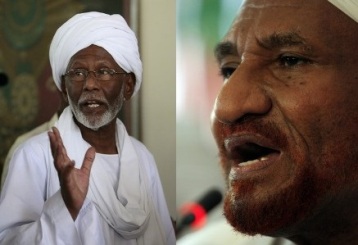Two major Sudanese opposition parties call on supporters to join protests
September 30, 2013 (KHARTOUM) – The leaders of the opposition National Umma Party (NUP) Al-Sadiq Al-Mahdi, and the Popular Congress Party (PCP) Hassan Al-Turabi have openly called upon their followers to join the protests which have been continuing for a week in many parts of Sudan following the government’s decision to remove fuel subsidies.

Over the weekend, more than 30 NCP officials and supporters sent a memo to president Omer Hassan Al-Bashir urging him to reinstate the fuel subsidies and implement sweeping political and economic reforms.
According to the Facebook page of the Islamists group known as al-Sa’ihoon, the petition signatories now surpassed 100. It includes the former head of the NCP parliamentary caucus Ghazi Salah al-Deen al-Attabani who was also Bashir’s adviser.
The ruling party is reportedly to probe those who signed it with focus on al-Attabani who an informed source told Al-Khartoum daily newspaper on Sunday that he will soon be expelled.
Sudanese officials insist that they had no other alternative but to cut subsidies to prevent an economic collapse.
The government which also pledged to increase the salaries of poor people says the “necessary economic measures” are justified by the “continuing economic sanctions against the peoples of Sudan”.
Thousands of Sudanese participated in the protests against the new measures. The demonstrators shouted slogans against the Bashir government such as “The people want the fall of the regime!” and “Freedom! Freedom!”.
Activists say over a hundred people were killed by the Sudanese security since the start of the protests while authorities admitted to the death of only 33 including policemen. They also accused protestors of vandalizing and damaging gas stations and public transportation buses.
In response the government shut down the internet for more than 24 hours and ordered a large number of newspapers to suspend publication including al-Intibaha which is owned by Bashir’s uncle/
Opposition parties have largely stayed on the sidelines during the protests though many members participated in their personal capacities.
The PCP said in a statement on Monday that the opposition alliance decided to overthrow the regime through a popular revolution after exhausting all calls for reform and correction.
It added that they offered solutions for the problems of Darfur and the economic crisis but it has fallen on deaf ears, pointing that the government only responded by tightening security and forging the will of the people.
The NUP leader al-Mahdi, for his part, called upon his party members and the Sudanese people to escalate protests and peacefully present their demands through processions, demonstrations, and sit-ins.
He announced that his party will organize a memorial ceremony on Tuesday for the martyrs who gave their lives for the country.
But many observers are skeptical on whether the NUP in particular is willing to move in the direction of the regime change as its leader has repeatedly said he wants to reform not to topple the NCP.
They also point out that Al-Mahdi’s son is Abdulrahman is currently Bashir’s assistant.
The NUP chief, who is also Sudan’s last democratically elected Prime Minister, has refused to join opposition efforts to mobilize the streets and distanced himself from anti-austerity demonstrations which took place last year.
The PCP renewed its rejection for the increase of fuel prices and the government’s failed policies and announced its support for the “revolution”, calling upon its members, opposition parties, and the Sudanese people to continue the peaceful protests.
It condemned the use of violence particularly killing of peaceful demonstrators by the government’s security forces, stressing that the regime must accept a transitional government which accommodates all political forces including the armed rebel groups or it has to face the fate of the tyrant regimes.
The PCP attributed the cause of the political turmoil and economic crisis to the tyrannical policies of the regime which led to the secession of South Sudan, wars in Darfur, South Kordofan, and Blue Nile, corruption, and violation of political and press freedoms, saying that people are paying the price for the government failures.
The PCP said that the regime has repeatedly arrested its cadres, shut down its newspaper, and suspended it activities, adding that ordinary citizens received the largest share of suffering and poverty.
(ST)
